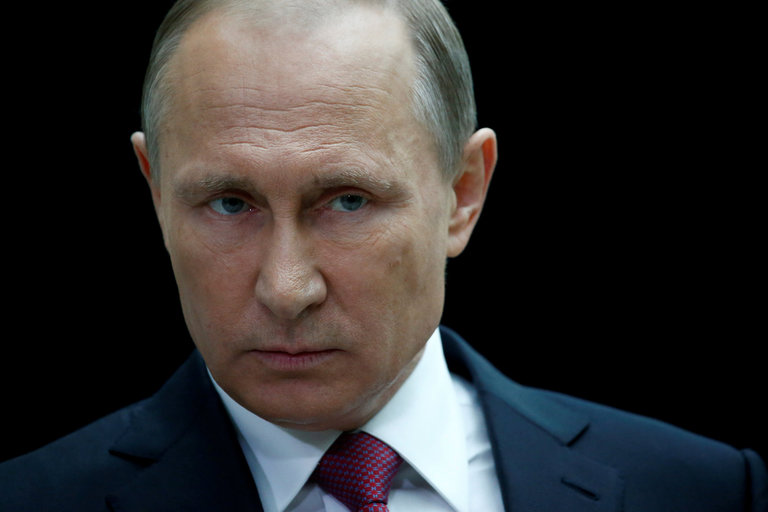
John McLaughlin,
who was the deputy director and acting director of the C.I.A. from 2000 to 2004, teaches at the Johns Hopkins School of Advanced International Studies in Washington and is a national security analyst for MSNBC.
President Vladimir Putin, of Russia, in June. Credit Sergei Karpukhin/Reuters
WASHINGTON — I last visited Russia in October to do research for a study of American-Russian relations. I returned home just before the election of President Trump, recognizing that the relationship was in terrible shape and heading steadily downhill. It continues on that trajectory, with Russia’s demand that the American diplomatic mission reduce its staff by 755 employees, in response to new sanctions imposed by Congress that were signed last week by President Trump.
That October trip and succeeding events raise important questions: Where does the United States want this to go? What is our vision of an acceptable end point? More than six months into the Trump administration, there are no answers.
A week before my trip, on Oct. 7, James R. Clapper Jr., then the director of national intelligence, and the Department of Homeland Security issued the first official American statement that Russia was interfering in our election process. When I and my colleagues confronted Kremlin and Foreign Ministry officials with this, they (as expected) adamantly denied it. They launched into the Kremlin narrative, arguing that the United States is responsible for any problems in the Russian-American relationship. They denounced American policies on NATO enlargement, the Balkans, Libya, democracy in former Soviet states and Syria, to mention just a few.
Added to this, Russia’s state-controlled media was full of war talk: If Hillary Clinton was elected, Russia and the United States would be on the verge of war and Russians should prepare their bomb shelters. Really.
This reminded me of a lesson I took away from earlier dealings with Russians: They always know what they want, so you’d better know whatyou want or they will roll right over you. And in today’s Russia, the question is what does Vladimir Putin want, because he calls the shots on anything of consequence. And his goals are quite clear: unchallenged dominance at home; heavy influence over his neighbors; a weakening of Western institutions like NATO and the European Union; and "great power” influence in key regions like the Middle East.
Pardon the phrase, but it’s all about making Russia great again.
Now, what do we want? Of course, we dare not let Russia have its way, whether it’s messing with our elections or violating borders of independent nations that look to us to enforce international agreements that we and they have signed. Still, we must avoid a shooting war with a country whose threshold for resorting to nuclear weapons is lower than ours.
Moreover, we shouldn’t fall into the trap of thinking this is just a new Cold War and then rely on the instincts we developed back then. The Cold War was actually simpler: a black-and-white global struggle between two diametrically opposed ideologies, one of which had to die. Theirs did. They lost their country, empire and the Communist economic system.
That struggle was checkers; today’s is chess.
The current clash with Russia cannot be about a total victory with no second act, because unlike the Soviet Union, Russia is not going away. So our strategy has to be about enforcing limits.
We can’t make Russia welcome NATO on its border, but we can work to strengthen NATO’s unity and deterrence strategy, counteract Russian diplomacy aimed at wavering members and build on steps like the recent forward deployment of NATO forces into the Baltic States and Poland — all the time attaching conditions for any diminution of pressure on Russia.
We cannot break Russia from an espionage habit that dates back to czarist times, but we can strengthen our counterintelligence capabilities and — very important — start systematically bringing to public light Russian "fake news” aimed at our citizens, as many European governments have begun doing.
We can’t change geography or force Russia to ignore neighboring regions where it has deep trade and cultural relations. But we can continue to punish Moscow for seizing territory or conducting covert influence operations intended to undercut a neighbor’s independence and limit its foreign policy options. We can give Ukraine more sophisticated defensive weapons to protect itself against Russian invaders. And we can keep turning up the pressure as Congress has done with new sanctions.
We cannot keep Mr. Putin from aspiring to overseas adventures like his expedition into Syria. But if the Trump administration can ever get its act together, we can work to restore our leadership in critical regions, which was diminished somewhat by the caution of the Obama administration and has since been damaged globally by Mr. Trump’s low credibility, along with the chaos in his White House. Leadership is slipping through our fingers, but it’s too soon to give up.
As for changing Russia domestically, a member of Ukraine’s Parliament told me in Kiev, "Ukraine is the only former Soviet state that can change Russia.” She meant that Russians regard Ukraine as the birthplace of the historic Slavic state (in the ninth century) and see Ukrainians as their closest ethnic relatives. If Ukraine could overcome its endemic corruption and develop a prosperous democracy, it would spur support for similar governance in Russia. Helping Ukraine is our most promising strategy and one that Mr. Putin fears. That’s why he invaded Ukraine.
In other words, today’s challenge is not how to see Russia crushed again, as it was when the Soviet Union collapsed; it’s about constraining its worst tendencies as it revives. That requires showing unrelenting firmness on what matters most to the United States, creating space for like-minded Russians to push for integration into the global system and in the meantime remaining alert for issues on which American and Russian interests converge enough to permit at least limited cooperation.



_jpg/250px-ElbeDay1945_(NARA_ww2-121).jpg)





